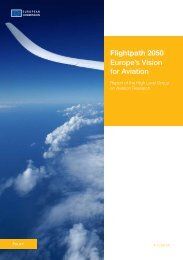Create
Final Report - Acare
Final Report - Acare
- No tags were found...
Create successful ePaper yourself
Turn your PDF publications into a flip-book with our unique Google optimized e-Paper software.
6<br />
A Summary of the Project<br />
This is the final report on the CREATE project<br />
(Grant Agreement 211512) of FP7 under<br />
designation “AAT-2007-7-4: Stimulating radical<br />
technological changes”. This was initiated<br />
following an earlier path-finding, but limited,<br />
project called “Out of the Box”.<br />
The CREATE project studied and tested all<br />
the steps necessary to take ideas for radical<br />
changes in air transport to actual research.<br />
This is called the CREATE process.<br />
It includes the mechanisms to encourage<br />
concepts and ideas to be put forward,<br />
providing assistance for their development<br />
and extension, allowing additional data and<br />
constructive views to be brought to their<br />
support and for the idea to be set out in a<br />
developed proposal for assessment for its<br />
suitability for research. The initial stage of<br />
research is called incubation.<br />
Five mechanisms were addressed: Creative<br />
Workshops, an Innopedia web-based<br />
discussion process, Technology Watch to<br />
introduce new technological opportunities,<br />
the IDEA Portal to assist originators to use<br />
these facilities and to develop their ideas<br />
and the Assessment process for impartial<br />
review. Each of these is described in detail in<br />
the report.<br />
The CREATE project set out to define, test<br />
by demonstration and refine each of the<br />
CREATE process components except that it<br />
was never the intention to carry out a trial<br />
of the incubation process given the cost and<br />
length of time that this would take. However,<br />
this apart, all the processes have been tested<br />
for their suitability for implementation<br />
and, where appropriate, the work needed<br />
to implement them has been defined. In<br />
two areas it is concluded that the processes<br />
examined should not be implemented with<br />
public funds, the establishment of the wikibased<br />
Innopedia and that of Technology<br />
Watch. In the area of incubation contracts<br />
no test has been carried out, nor was one<br />
intended in the project description. However,<br />
the preliminaries to such a contract and the<br />
management of it have been studied and are<br />
reported.<br />
The CREATE process is concerned with<br />
innovation in aviation. It does not seek to<br />
address all kinds of innovation but a relatively<br />
narrow, important part of the whole. It does<br />
not displace any other routes to innovation but<br />
augments them.<br />
It aims to stimulate novel changes to the<br />
aviation system with particular attention to<br />
those that are cross-sector, transformational<br />
in their implications, and concerned with the<br />
long-term future aviation system. ‘Innovation’<br />
is a very broad topic and covers every kind of<br />
novel change from the smallest amendment<br />
to a business process up to the most radical,<br />
far-reaching, often technologically based<br />
application of a new idea. It is important,<br />
therefore that the boundaries of the CREATE<br />
process are understood.<br />
The background to innovation in this Report<br />
briefly covers the historical pressures for<br />
change in aviation and explains how these<br />
pressures have changed and become more<br />
integrated in their application to the air<br />
transport system. The Report shows that the<br />
high benefit, high risk class of innovations<br />
described above as the focus for the CREATE<br />
process effectively has no mechanism by<br />
which they can be studied for potential use<br />
in the long term future. The reasons for this<br />
are explored and related to the current and<br />
future challenges that the air transport system<br />
will face. The need for a new mechanism<br />
is explained - one which will address this<br />
particular set of innovations and allow them to<br />
be studied and tested for validity as potential<br />
elements in a future air transport system.<br />
Most novel ideas face hostility and it is no<br />
different, is perhaps even more accentuated,<br />
in this particular sub-set. Given the radical<br />
nature of some of the ideas it is likely that they<br />
would face premature and negative decisions.<br />
To overcome this the key process element<br />
is seen to be an “incubation” stage. This is<br />
comparable to a nursery for children; the child<br />
is allowed to grow in a protected environment,<br />
to acquire greater knowledge free of demands<br />
for performance. Eventually, of course, the<br />
child must meet the demands for performance,<br />
competition and choice but the period in the<br />
nursery equips them to meet these forces.<br />
Incubation as a concept is a parallel to this. It<br />
will provide a protected environment where the<br />
viability of an idea can be studied, expanded<br />
and developed to the stage where it can<br />
provide comparable credibility to established<br />
evolutionary ideas. In one respect, however, the<br />
incubation stage is unlike a nursery. If the work<br />
to develop the idea shows that it cannot work<br />
then the incubation should be stopped.



